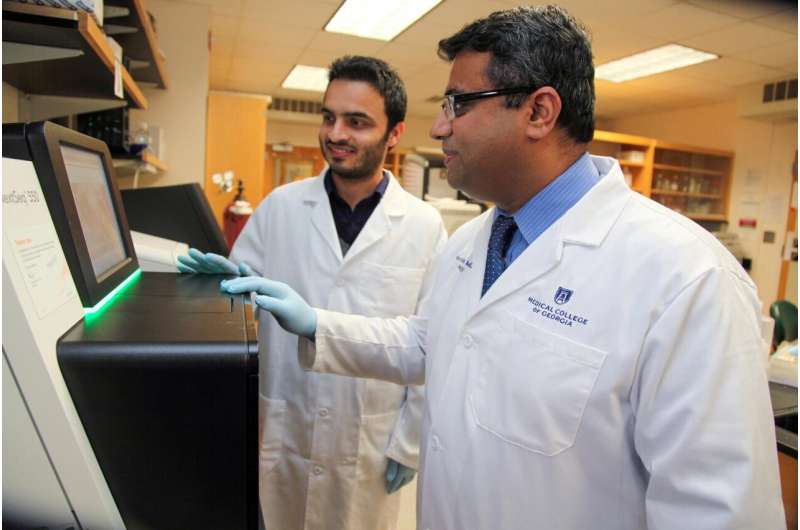High expression of cell death genes associated with early death from lung cancer

Patients with a high number of genes most associated with pathways that lead to cell death in lung cancer are at increased risk of dying early from their disease, researchers report.
Also seemingly paradoxically, patients with high expression of this "21-gene cell death signature" the researchers have identified, have indicators that their immune system is attacking the cancer, like higher levels of cytotoxic T cells, which typically kill cancer.
But they also have high levels of molecules that can suppress those T cells, helping transform them into dysfunctional, "exhausted" T cells, they report in the journal Cancers.
This novel genomic signature can be used both to better predict how a patient with lung cancer will do and, more importantly, to better tailor treatments to improve patient survival, says Dr. Ravindra Kolhe, director of the Georgia Esoteric and Molecular (GEM) Laboratory, and vice chair for translational research in the Medical College of Georgia Department of Pathology.
"Immunotherapy is a great approach to treatment but it's not going to be effective in everyone, and we think this will help identify at the point of diagnosis which immunotherapy will benefit a patient the most," says Kolhe, the study's corresponding author.
For example, cancer cells use immune checkpoints, like the protein PD-L1, which normally protects our own cells from being attacked by the immune system, to shield themselves from T cells. The study found a compromised immune function in the tumor microenvironment of patients with the highest cell death index. That means those patients should benefit from immune checkpoint inhibitors like PD-L1 inhibitors, to better enable the immune system to attack their cancer, Kolhe says.
To find a way to improve patient survival, they started by looking at how cells die in this cancer.
Millions of cells die daily and the ways they die include so-called programmed cell death, including apoptosis, in which cells commit suicide because, for example, they have a mutation that cannot be repaired that might cause cancer; and autophagy, where cells basically consume themselves, because of a problem like a malfunctioning component. The more passive, unplanned death is necrosis, where cells might die because of injury. The immune system naturally works through these genes and pathways to kill off invaders and so do cancer treatments like chemotherapy and immunotherapy.
They looked at retrospective data on 510 patients with lung cancer from the national Cancer Genome Atlas, a joint effort of the National Cancer Institute and National Human Genome Research Institute. Genes involved in the different modes of cell death in these patients were assessed, and the researchers found 21 genes occurred most often. They identified 59 individuals with the highest expression and 49 with the lowest expression of these most prominent cell death genes. They also looked at key indicators of immune system activity and compared overall survival, disease-free survival and disease-specific survival in those two groups.
While a prospective study is still needed, Kolhe hopes the cell death index that emerged, will soon give patients with lung cancer, at the time of their diagnosis, the same benefits that good prognostic markers today provide patients with breast cancer.
Lung cancer is the third most common cancer in the United States and the leading cause of cancer death among men and women, according to the Centers for Disease Control and Prevention.
The Food and Drug Administration approved the first lung cancer specific immunotherapy in 2015 and more are currently in clinical trials. Standard lung cancer treatment has included surgery, chemotherapy and radiation with immunotherapy a more recent adjunct, that has helped patients with advanced lung cancer live longer, according to the Cancer Research Institute.
In their early assessment of patients, molecular and genetic pathologists like Kolhe also routinely run a panel for a handful of genes known to drive lung cancer, like EGFR, a protein on the cell surface that normally helps cells grow and divide. In the most common lung cancer type, non-small cell lung cancer, which Kolhe looked at in this study, there can be mutations in EGFR which result, for example, in a lot more of the protein which enables rapid cancer cell growth, and there are inhibitors that block some of these mutations at least for a time.
More information: Pankaj Ahluwalia et al. Immunogenomic Gene Signature of Cell-Death Associated Genes with Prognostic Implications in Lung Cancer, Cancers (2021). DOI: 10.3390/cancers13010155




















